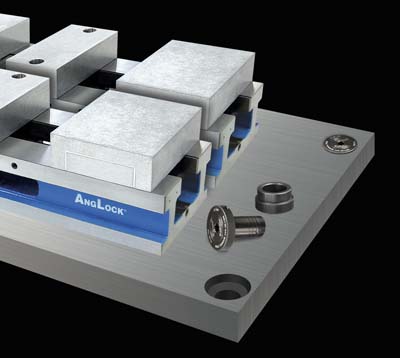PinLock Locating and Mounting System
PinLock Locating and Mounting System
Kurt's new PinLock system makes attaching and removing fixtures, subplates and vises from machining centers precise, fast and easy.

Kurt's new PinLock system makes attaching and removing fixtures, subplates and vises from machining centers precise, fast and easy. It is also ideal for setting up and interchanging multiple pallets for a series of machining centers. What's unique about Kurt's PinLock is its new helical extraction design. This feature aids in overcoming binding in side load conditions and enhances the removal of the PinLock in any application.
Kurt's PinLock system uses a pin assembly to engage and create a locking force with line contact, as opposed to other competitive systems that use point contact. The Kurt PinLock system also is interchangeable with competitive ball locking systems. The PinLock system consists of high precision pins, bushings and liners that provide locating repeatability up to +/-0.0005 inch.
Manufactured to Kurt's high precision standards, PinLock shanks and bushings are precision machined of heat-treated, alloy steel with a black oxide finish. PinLock liner bushings are available for fixture plate thickness of 0.75 and 1.00 inch for the 20, 25 and 30mm sizes. The larger size PinLock liner bushings are available for 0.75, 1.00, 1.50 and 2.00 inch fixture plate thicknesses. Back mount and front mount receiver bushings are available for receiver plate thickness of 0.75 to 2.00 inches.
"The PinLock system provides precision manufacturers with another set of top quality Kurt accessories for their workholding needs," reports Steve Kane, global sales and marketing manager for Kurt Industrial Products. "The PinLock system is the perfect addition to Kurt grid plates, caged modular tombstones, and vise adapter plates. They provide manufacturers with a time-proven, one-stop source for building modular workholding as needed for quick changeovers and high repeatability."





